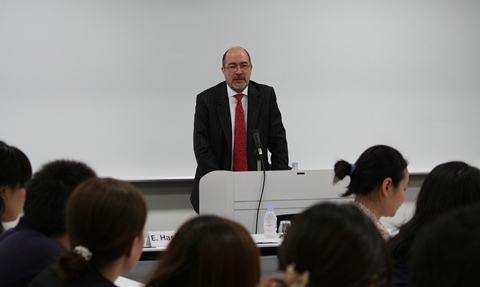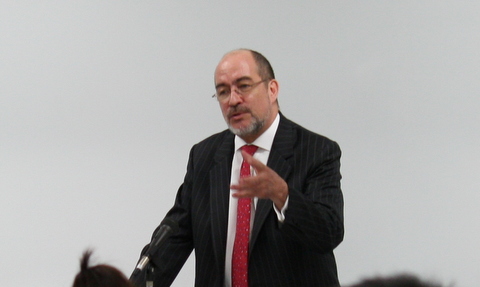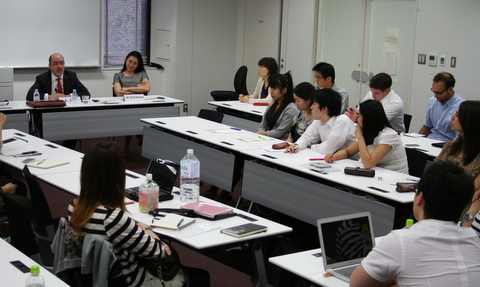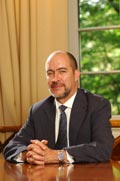The 70th Public Policy Seminar
Roundtable: “The WTO's Role in International Society”

Date and Time: June 8th, Friday, 16:45-18:00
Venue: 2F Conference Room, Kojima Hall
Program
| 16:45-17:25 | Lecture “The WTO's Role in International Society” |
|---|---|
| Alejandro Jara | |
| 17:25-18:00 | Roundtable |
| Moderator: Prof. Kazumasa Kusaka (GraSPP) |
Summary
Deputy Director General of the WTO, Mr. Alejandro Jara visited University of Tokyo and gave a lecture on “WTO's Role in the International Society”, on 8 June 2012.

First, he introduced five functions of the WTO, which are; (1) setting of rules and legal obligations which are a global public good; (2) dispute settlement mechanism; (3) surveillance and monitoring through notifications received, the trade policy mechanism, and the monitoring of protectionism; (4) technical assistance and capacity building and (5) liberalization through rounds of trade negotiation. He also clarified that the deadlock of the current negotiation was not because consensus among 156 Members was difficult, but resulted from a political crisis in a few countries and the lack of political leadership. While emphasizing the importance and benefit of liberalization in creating markets and jobs, he explained what is happening in Geneva. The trade negotiation in the current round used to be about better market access in agriculture, but now the exporting countries have supply capacity problem. Developed countries are asking the emerging economies such as China, India and Brazil to make far more concessions than what they expected 10 years ago. Members have agreed to keep the DDA alive and recognize that they need to explore areas in which progress is possible such as duty-free quota-free market access for the LDCs.
He also mentioned the relationship between the multilateral trading system and regional/preferential trade agreements. While enhanced liberalization through cutting tariffs under a number of free trade agreements (FTAs) are welcome by the WTO, there are substantial issues that cannot be solved under FTAs and can be agreed only with the package under the multilateral regime, such as elimination of distorting subsidies in agriculture and fishery subsidies, and the rules of trade remedies.
DDG Mr. Jara then provided the future direction of the Doha Development Agenda. Considering that the current trade negotiation reflects the agenda in the past and that the business at present has been substantially changed with prevailing 'global supply chains', he affirmed the need to find a new way to look at trade and to change the trade rules. He proposed that the possible new agenda could include rules on foreign direct investment, competition policy, and export restriction, among other issues.
Lastly, he emphasized the need of better skills of students, universities and think tanks, especially in Asia. Compared to other regions such as the United States and Europe, the number of think tanks and institutes related to trade in Asia is far behind, despite the fact that the region is very important in terms of trade, with the fastest growing economies and the biggest trading partners. He insisted on the need to fill such a gap, and expected that critical thinking would come up from the Asian region.
With regard to the WTO/FTA relationship, he emphasized that FTAs were within the WTO legal framework. FTAs enhance the liberalization in goods and services, since the negotiations largely bind what parties have liberalized unilaterally, and make it easier to converge multilaterally in the futur. But there is a risk that differences in regulatory frameworks in FTA— for example, on investment — may create serious obstacles to multilateral convergence.

Profile of Ambassador Alejandro Jara

Alejandro Jara was born in 1949 in Santiago, Chile. He studied high school in Rio de Janeiro, Brazil and Santiago, Chile. In 1973 he obtained his law degree from the Universidad de Chile. With the support of a Fulbright scholarship he pursued graduate studies at the Law School, University of California at Berkeley (1975-1976).
In 1976 he joined the Foreign Service of Chile where he has specialized in international economic relations. He served in the Delegation of Chile to the GATT in Geneva (1979-1984) and was seconded to the Economic System for Latin America (SELA) in Caracas as Coordinator for Trade Policy Affairs. He was appointed Director for Bilateral Economic Affairs (1993-1994), Director for Multilateral Economic Affairs (1994-1999). During 1996-1997 he also served as Chile's Senior Official to APEC. At the same period he was deputy Chief negotiator for the Chile — Canada Free Trade Agreement and in 1997-1998 he was Chief negotiator for the Chile — Mexico Free Trade Agreement. In July 1999 he was designated Director General for International Economic Relations. In June 2000 he was appointed as Ambassador, Permanent Representative of Chile to the World Trade Organization in Geneva. During 2001 he served as Chairperson of the Committee on Trade and Environment of the WTO. In February 2002 he was elected as Chairman of the Special Session of the Council for Trade in Services, which is in charge of the negotiations mandated by Ministers in Doha. He is author of numerous articles and papers on international trade. Mr. Jara is married to Daniela Benavente and has three children, Rafael Alejandro (1986), Octavia Verónica (2003) and Matilde (2007).

